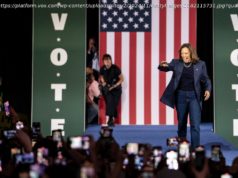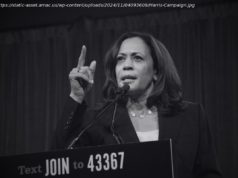The president announces his reelection bid—a development both highly improbable and totally expected.
Joe Biden’s announcement today that he is running for president in 2024 is at once entirely predictable and exceptionally improbable.
In a video released early this morning, the president formally announced his reelection bid, seeking to swipe a traditional Republican theme—freedom—for his own campaign.
“That’s been the work of my first term: to fight for our democracy, to protect our rights,” Biden says. “To make sure that everyone in this country is treated equally, that everyone is given a fair shot.”
But he accuses “MAGA extremists” of seeking to cut Social Security (true of many Republicans, though not of Donald Trump), prohibit abortion, make voting harder, and ban books.
“The question we’re facing is whether in the years ahead we have more freedom or less freedom. More rights or fewer,” Biden says. “I know what I want the answer to be, and I think you do too. This is not a time to be complacent.”
The video is classic Bidenalia: aviators and hugs, snapshots of union workers and of Supreme Court Justice Ketanji Brown Jackson. “This is our moment,” he says. “Let’s finish this job.”
If this is Biden’s moment, it’s not one that many people saw coming just a few years ago. The announcement is predictable because Biden has been signaling that he would run for a second term for years now—a signal that many people took to be a feint at first, but that most had gradually come to believe was real. And it’s predictable because an incumbent president with a robust list of accomplishments and no serious primary challengers (sorry, Robert F. Kennedy Jr.) is all but certain to try for four more years.
Yet for a long time, the very idea that Biden would ever be president seemed dubious, despite his long-standing desire to hold the office. He failed in 1988 and 2008, and reluctantly passed on running in 2016. Right up until the February 29, 2020, South Carolina Democratic primary (how’s that date for improbable?), what everyone thought was Biden’s final attempt also seemed destined for failure. Then he turned things around, cruising through the Democratic field. That spring and summer was a tumultuous time in the United States, when much of normal life shut down because of COVID and widespread unrest over police violence occurred. By November, Biden was the favorite to beat Trump—which he did, though not by as much as some polls predicted—and then he finally attained his lifelong goal.
Even after Biden took office, doubts persisted that he’d try for a second term. He is already the oldest president in American history, and at times his age has shown. His presidency has seen some hiccups—most notably, inflation and the disastrous end to the American occupation of Afghanistan. But Biden has also assembled a record of achievement that rivals or exceeds the first term of any Democratic president for decades, and far surpasses what most people expected. (Biden has long profited from beating low expectations.)
Another reason for doubts about a Biden reprise was that he is not especially popular. Although his numbers have rebounded somewhat, he remains underwater. Yet Biden has managed to maintain the coalition that put him in office, in part because revulsion over the January 6 insurrection and the ongoing threat of another Trump presidency have kept it together. He’s also fended off any primary challenge from the party mainstream. In doing this, he benefits from structural advantages of the presidency; from co-opting likely challengers, such as Vice President Kamala Harris and Transportation Secretary Pete Buttigieg; and from what I’ve called the catch-24: He has made clear he’ll run unless he thinks another moderate can beat Trump if he’s the GOP nominee, but no moderate will run as long as Biden is running.
During the 2020 primary, Biden tried to neutralize concerns about his age as well as his station as a vestige of the Democratic Party’s past by presenting himself as a transitional figure. “Look, I view myself as a bridge, not as anything else,” he said. “There’s an entire generation of leaders you saw stand behind me. They are the future of this country.”
With today’s announcement, we now see that the bridge is longer than it might have seemed at the time. One question is what Biden’s persistence means for members of the generation he mentioned. Does he stifle them and the chance at a new Democratic Party by running again? Or does he allow more time for a stronger bench to develop? Harris and Buttigieg have arguably seen their stars tarnished—or at least not burnished—by their service in the Biden administration.
Extra time could give either of them the chance to improve their public profile, or to self-sabotage. It could also allow other Democrats, perhaps Governors Gretchen Whitmer of Michigan or Gavin Newsom of California, to prepare for the national stage. If Biden is able to win reelection, expect questions about whether he will be able to serve another four years—or move aside in favor of his vice president before the 2028 election. But before then, a long and likely rough campaign is ahead.
This cheat sheet tracks who’s in, out, up, and down in the 2024 races. It will be updated as the campaign develops, so check in regularly.DEMOCRATS
Who is he?
After decades of trying, Biden is the president of the United States.
Is he running?
Yes. Biden formally announced his run on April 25.
Why does he want to run?
Biden’s slogan is apparently “Let’s finish the job.” He centered his launch video on the theme of freedom, but underlying all of this is his apparent belief that he may be the only person who can defeat Donald Trump in a head-to-head matchup.
Who wants him to run?
There’s the catch. Some prominent Democrats support his bid for a second term, but voters have consistently told pollsters they don’t want him to run again.
Can he win the nomination?
Barring unforeseen catastrophe, yes. No incumbent president has lost the nomination in the modern era, and Biden has pushed through changes to the Democratic-primary process that make him an even more prohibitive favorite.
What else do we know?
Biden is already the oldest person elected president and to serve as president, so a second term would set more records.
Who is she?
Harris is the vice president of the United States.
Is she running?
No, but if Biden were to bow out, she’d be the immediate favorite.
Why does she want to run?
One problem with her 2020 presidential campaign was the lack of a clear answer to this question. Perhaps running on the Biden-Harris legacy would help fill in the blank.
Who wants her to run?
Some Democrats are excited about the prospect of nominating a woman of color, but generally Harris’s struggles as a candidate and in defining a role for herself (in the admittedly impossible position of VP) have resulted in nervousness about her as a standard-bearer.
Can she win the nomination?
Not right now.
Who is he?
Mayor Pete is Secretary Pete now, overseeing the Department of Transportation.
Is he running?
No, but he would also be a likely candidate if Biden stepped away.
Why does he want to run?
Just as he was four years ago, Buttigieg is a young, ambitious politician with a moderate, technocratic vision of government.
Who wants him to run?
Buttigieg’s fans are passionate, and Biden showed that moderates remain a force in the party.
Can he win the nomination?
Not at this moment.
Who is he?
The senator from Vermont is changeless, ageless, ever the same.






